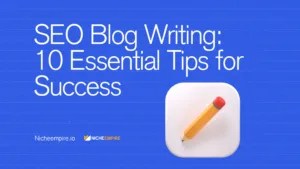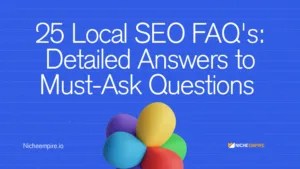Ever wondered what the difference between on-page SEO and off-page SEO is? You are not alone. Though they are vital SEO strategies, they focus on different aspects but complement each other.
On-page SEO optimizes your web pages internally for more visibility on Search Engine Result Pages (SERPs).
While off-page SEO is for implementing strategies outside your website (externally) to improve search engine rankings.
However, both on-page and off-page SEO can drive traffic to your website and increase user engagement and conversion.
Read on to learn more about their differences and why they are essential for your SEO efforts.
Overview
- What On-Page SEO?
- What is Off-page SEO?
- SEO On-Page And Off-Page Comparison
- SEO On-page And Off-Page: More On Their Differences
- Importance of SEO On-Page and Off-page
- Attributes of On-page SEO
- Proven Off-page SEO Techniques
- Conclusion
- FAQs
What On-Page SEO?
Before we delve into the differences between On-page and Off-page SEO, let’s understand what they are.
On-page SEO is carried out on the website and is an integral part of optimization.
This involves optimizing your content to answer search intent, ensuring readers get value from your website. It signals to search engines that your website contains relevant and valuable content.
As a result, your website will have more traffic, visibility, and higher rankings on search engines.
Our On-page SEO guide for beginners might interest you.
What is Off-page SEO?
Also known as off-site SEO, Off-page SEO includes techniques that help a website build domain authority. Interestingly, this optimization is done online but not on your website.
The primary reason for off-page SEO is for users and search engines to see your website as credible and with authority.
Learn about Off-page SEO techniques.
SEO On-Page And Off-Page Comparison
The table below compares the two SEO strategies.
| Factors | On-Page | Off-page |
| Purpose | On-site optimization of your webpage for search engine ranking | Optimization of your webpage outside your website to increase visibility |
| Ranking Impact | Increases visibility and relevance directly on your website | Boosts authority, credibility, and reputation of your website from external sources |
| Content Marketing | An essential approach in the On-page optimization campaign | It entails making your content valuable and user-friendly for promotion outside your website |
| Backlinks | Focuses on internal linking on your website | Focuses on obtaining premium backlinks from external sources. |
| Authority Building | Presents your content as an authority | Builds the authority of your website |
| Performance Control | Website owners are entirely in charge | External structures influence performance; you have partial control |
| Link Building | Prioritizes internal linking on the website, an essential off-page SEO factor | External factors mainly contribute to the website’s diverse, natural links |
| Social Media Presence | It can be fused into on-page SEO, although it is not its paramount focus | Acquires online promotion through active engagement on social media |
| Essential Segments | Keyword optimization URL structure Internal linking Optimized, valuable, user-friendly content Meta Tags | High-quality backlinks Influencer Marketing Social Media Marketing Brand Mentions |
SEO On-page And Off-Page: More On Their Differences
According to Search Engine Journal, Google’s top three ranking factors are links, user experience, and quality content.
This shows the importance of optimizing your webpage’s on-page and off-page SEO strategies.
- On-page SEO involves techniques you implement to rank on the search engine result page. Its primary purpose is to ensure that search engines like Google, Yahoo, Baidu, Bing, Duck Duck Go, and AOL understand your content.
By understanding your content, they can show it to people searching for information your website contains.
A page is regarded as optimized when it satisfies user intent. Search engines use on-page elements such as keywords and meta descriptions to meet users’ intents.
- Off-page SEO’s main objective is to present your website and content as authentic and authoritative. When other sites link to your website, it’s like giving it a vote of confidence.

.
Importance of SEO On-Page and Off-page
SEO On-page SEO and Off-page aim to help your website attain visibility on search engines. A 2024 report by AISEO reveals that over 99,000 searches occur on Google every second.
This means you can reach a larger pool of leads with on-page and off-page optimization.
1. The Strategies Boost Website Ranking
Implementing on-page and off-page SEO practices improves your website’s search results ranking.
While the former helps search engines understand your website and improve its content, the latter allows it to build authority. Off-page SEO lends credibility to your website and boosts your On-page efforts.
They create a solid foundation for your website’s easy climb to the top of the search engine ladder. Though distinct, they complement each other.
2. On-page and Off-page SEO With Google’s E-E-A-T Is A Game Changer
A holistic SEO strategy incorporating E-E-A-T and both on-page and off-page SEO satisfies the desires of Google and your audience.
Experience
Google values content written from personal experience. Such content usually meets user intent as it is relatable, result-oriented, and engaging.
Authoritativeness
This refers to the estimation in which your website or content is commonly held in your preferred niche.
Trustworthiness
Google advocates your content or website must be transparent, accurate, and legitimate.
In addition, this benchmark fact-checks other factors, such as the source of your content, ownership of information, and much more.
Expertise
This entails the knowledge your website displays about a particular piece of content. Google values expertise highly.
Find out more on EEAT SEO.
How On-Page And Off-Page SEO Contribute To E-E-A-T
The table below captures how both strategies boost E-E-A-T.
| On-Page SEO | Off-Page SEO | |
| Experience | Features authentic lessons and success stories learned to showcase practical knowledge. | Shows expertise by being mentioned and getting involved in online industry communities. |
| Expertise | Enhances reputation by showcasing author authority through qualifications and clear insights. | Builds authority through endorsements from reputable industry sources. |
| Authoritativeness | Enhances E-E-A-T using relevant keywords in key page elements to showcase authoritative insight. | Improves EEAT by earning authoritative mentions. |
| Trustworthiness | Establishes brand accessibility, consistency, and accuracy, securing readers’ trust. | Encourages user reviews and social validation. |
They Generate Lots of Web Traffic
A combined strategy of On-page and Off-page SEO pulls loads of traffic to a website. When content satisfies search intent, searchers will likely click the link and engage with your content.
While you can focus more on one of these SEO strategies as a beginner, do not sideline any off-page SEO factors as time progresses.
Attributes of On-page SEO
To fully appreciate the differences between on-page and off-page SEO, you must understand what to do on and outside your webpage.
On-page SEO includes the following:
Website Optimization
This involves improving your website’s performance for enhanced user experience and subsequent ranking on search engine result pages.
Website optimization is an effective way of generating leads and converting visitors into customers.
While optimizing your website, also pay attention to technical SEO. It improves page speed, ensures your website is mobile-friendly, and applies schema markup.
Content Optimization
Content optimization means improving the content to be valuable, SEO-friendly, engaging, and to reach a large audience.
Its primary aim is to satisfy user intent and improve ranking.
To achieve this, you must:
- Conduct keyword research
- Make use of a focus keyword
- Optimize your title tag
- Create only quality content
- Avoid stuffing your keywords in your content
- Use H1 for headline, H2, H3 for subheadings and so on
- Meta-description must trigger user engagement or clicks
- Ensure your URL slug is SEO-friendly by adding your keyword and making it short
Internal Linking and Navigation Optimization
Internal linking optimization involves tactically inserting hyperlinks on a webpage to link to other pages on the website, boosting SEO performance.
This technique helps users find other related content, and search engines fully grasp the website’s structure. Internal links are key for navigation and finding your content by search engines and users.
Here’s why internal links are important for SEO.
Video and Image Optimization
Video and image optimization is an SEO strategy that involves adjusting videos and images on a website to rank on search engines and boost website visibility.
Your visual content must be relatable to your topic, have high quality, and be saved with keywords.
Proven Off-page SEO Techniques
Link Building
Link building is the process of earning links from other websites, known as backlinks. This practice is arguably the backbone of off-page SEO.
By linking to your website, these other websites tell Google that your website is authoritative, credible, and trustworthy.
A website or content appears more authoritative to search engines when it builds links from exceptionally reputable websites. Remember, quality is far more critical than quantity.
Find out more about SEO backlinks.
Content Marketing
This off-page SEO campaign involves planning, creating, and sharing valuable content with a targeted audience to attract, engage, and convert.
Content marketing is not just sharing content to get more leads and sales; it is way beyond that. This technique is also excellent for earning backlinks and thrusting your website before a larger audience.
You can also establish yourself as a reputable authority through guest blogging.
Online Reviews
Reviews are one way to build reputation and credibility online. Google considers reviews when ascertaining a website’s credibility. Hence, reviews are crucial in off-page search engine optimization.
Social media participation is also key. You need to be active on third-party platforms and take social media marketing seriously.
Local SEO
Local SEO entails optimizing your brand’s online presence to boost awareness and visibility within its local region. One way to do local SEO is to maximize the business listing tool, Google Business Profile (GBP). Do not sideline local SEO.
Get answers to your local SEO questions.
Events
Event is one effective way brands engage their target audience and build credibility. Besides physical attendance, they provide an opportunity for publicity, pushing you before a global audience through mentions.
Speakers and influencers in such meetings could help create a buzz by mentioning your brand to their followers. As a result, driving organic traffic to your website.
In essence, influencer marketing is ideal. Partnering with influencers is one of the fastest ways to increase your brand’s visibility.
Get all the help you need with our Off-page SEO checklist.
Conclusion
On-page and Off-page SEO, while different, are both members of the same team. They are essential components of SEO that can boost your website’s reach and rankings on search engine result pages (SERPs).
Now you know how they differ, their importance, and how to implement them.
If you find this blog post helpful, check out our other valuable digital marketing and SEO articles.
Frequently Asked Questions
What is SEO On-page and Off-page?
On-page and Off-page SEO strategies involve fine-tuning your web content to gain visibility and rank on SERPs and optimizing your website to build authority, relevance, and credibility.
What is the difference between offsite SEO and onsite SEO?
Offsite SEO refers to optimization practices outside the webpage that help build a website’s credibility and reputation, while On-page SEO refers to optimization practices on the webpage.
Is local SEO on-page or off-page?
Local SEO is an off-page SEO optimization technique that increases a brand’s awareness and visibility to a target audience within its geographical area.
One way to do local SEO is by maximizing Google Business Profile (GBP).
What are SEO on-page and off-page factors?
On-page SEO factors include:
- Relevant keywords
- Quality content
- Internal links
- SEO-friendly URL
- Meta description
- Optimized title tags
- Page speed
Off-page SEO factors include:
- Local SEO
- Backlinks
- Content marketing
- Influencer Marketing
- Events
- Online Reviews
- Social Media
Is technical SEO on-page or off-page?
Technical SEO is not entirely on-page SEO. On-page SEO optimizes your website internally, and technical SEO improves how your website functions.
This behind-the-scenes strategy involves making your website better, faster, and more crawlable. Nonetheless, technical SEO complements On-page SEO.
Do Links Still Matter for Rankings?
Yes, links are crucial for ranking. However, they are not the only factor that guarantees ranking.
Google considers the quality of links to a website more important than the quantity of links such a website boasts. The higher the quality, the better the ranking.



